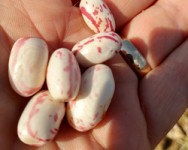2020 NYS Dry Bean Meeting
Event Details
Date
March 10, 2020
Time
9:00 AM - 12:00 noon; lunch will follow the event
Location
First United Methodist Church
8221 Lewiston Rd (Rt 63)
Batavia, NY 14020
Cost
CVP enrollee : $25.00
(addl attendee $25.00 ea.)
Cornell Vegetable Program enrollees receive a discounted price for this event. Includes lunch.
Non-CVP enrollee : $35.00
(addl attendee $35.00 ea.)
Includes lunch.
Host
Cornell Vegetable ProgramMargie Lund
607-377-9109
email Margie Lund

Join us for research and production updates on dry bean varieties and bean breeding, weed management, Western bean cutworm, and white mold disease. A market analysis will be provided as well. We will review research priorities and gather suggestions for future educational programs. 1.25 DEC recertification credits will be available in categories 10, 1a, 21, and 23.
Agenda
9:00 AM Registration, Sign-in for DEC Credits
9:30 AM Welcome/Announcements
9:35 AM Overview of the 2019 growing season and market update - Jerry Jones, NY Bean and Matt Stawowy, Steele & Co
9:45 AM Determine the magnitude and distribution of Western bean cutworm, and the risk to dry beans, in the major production area in New York - Marion Zuefle, NYS IPM Program
10:00 AM Towards a durable management strategy for white mold in dry beans in New York (2019/20): The status of fungicide sensitivity within the Sclerotinia sclerotiorum population - Sarah Pethybridge, Cornell
10:20 AM Palmer amaranth and weeds update - Lynn Sosnoskie, Cornell
10:40 AM Quick Stretch Break
10:50 AM Breeding, evaluation and development of dry bean varieties that are highly adapted to NYS growing environments and markets - Phillip Griffiths, Cornell
11:10 AM Comparison of new and standard dry bean varieties at NYSAES research farm - Jim Ballerstein and Michael Rosato, Cornell
11:30 AM Cool School Food: Encouraging the use of dry beans in school lunches, and promoting the health aspects of dry bean consumption - Amie Hamlin, NY Coalition for Healthy School Food
11:45 AM NYS Dry Bean Industry Advisory Committee Meeting
12:00 PM Adjourn - DEC Credit Sheets available for pick up
COST: $25 Cornell Vegetable Program enrollees; $35 all others. Lunch is included in the registration fee. Stay to network with fellow growers and event speakers. For more information about this meeting, contact Margie Lund.
We appreciate the generous support of New York Bean LLC in sponsoring this event!

Upcoming Events
Orleans Regional Winter Vegetable Meeting
February 9, 2026
Albion, NY
Topics include: Breeding and evaluating tomatoes to control disease and improve yield, jar testing and ensuring spray water quality, breaking down organic matter, FSMA updates and Q&A with Ag & Markets, and industry updates. Includes hands-on learning, coffee break, and sponsor booths.
DEC credits available: 1.0 in CORE plus 0.5 in 1a, 10 or 23
African Eggplant Participatory Breeding Kick-Off
March 5, 2026
Join us to learn about the Cornell African Eggplant Research Project and learn how you can participate! African eggplant, also known as Bitterball, Garden Egg, Kittley and other names, is an important crop for many members of our community with heritage from regions such as sub-Saharan Africa, Southeast Asia, and Brazil. Since 2024, the Cornell African Eggplant Research Project has been collaborating with growers and community partners across New York to develop high-quality varieties adapted to the Northeast U.S. In this meeting, we will share information about growing and preparing African eggplant, highlight our research to date, and invite partners to collaborate with us in our 2026 participatory breeding and variety selection efforts.
COST: FREE! You must pre-register to receive the Zoom link.
Managing the Invasive Swede Midge Webinar
March 6, 2026
Swede midge is an invasive fly that causes serious economic losses to brassica crops. Due to its small size and hidden feeding habits, swede midge is often called an "invisible pest" and damage may be misdiagnosed. In this webinar, we will review the swede midge life cycle and crop damage symptoms, current management recommendations, new research findings, and highlights from on-farm case studies with a focus on organic management.
1.75 DEC pesticide recertification credits in categories 1a, 10, and 23.


































